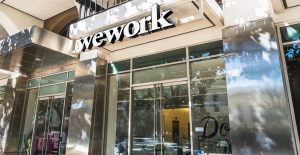Despite multiple crises, Germans bought slightly more cars last year than in the previous year. According to the Federal Motor Transport Authority (KBA), the number of new registrations rose by 1.1 percent to 2.65 million passenger cars in 2022 compared to 2021. This is the second worst figure since reunification.
In the previous year, the automobile market had fallen to its lowest level in decades. The number of registrations is still a long way from the level of 2019, before the corona pandemic. At that time, 3.6 million passenger cars were newly registered in Germany.
Above all, the figures reflect the limited production possibilities of the manufacturers and less the demand. For the past two years, there has been a significant excess demand on the automotive market: practically all cars that are produced have already been sold.
This has led to sharply increased prices for new and used cars and to long waiting times for customers. According to estimates from the industry, car production in Europe is currently sold out for about six months in advance.
According to the German Association of the Automotive Industry (VDA), around 3.4 million vehicles were produced in Germany in 2022, almost eleven percent more than in 2021, but still less than in 2020. If the industry does not recover from this slump, this is likely to have an impact on the economy as a whole have land.
In the years before the Corona crisis, the auto industry in Germany had mostly produced more than five million cars a year. Production continues to be slowed down by a lack of semiconductors and rising prices for raw materials.
In addition, the crises in the world can be seen from the registration curve of the past year: After Russia's attack on Ukraine on February 24, cable harnesses that had been manufactured there were suddenly missing in the industry. The outages in the plants led to a downturn in sales in April with a slight delay. The number of registrations then hardly grew until October.
"The lack of primary and intermediate products, the high energy and raw material prices and the general uncertainty due to the war in Ukraine had dampened the market and production considerably throughout the year - but especially in the first half of the year," says the VDA .
The market only started a final spurt in November and December. In the last month of the year, registrations were 38.1 percent higher than in December 2021.
The strong increase is due to a sales sale for electric cars - since January 1, significantly lower subsidies for electric cars have been paid out and plug-in hybrids are no longer subsidized at all. Peter Fuss, partner at EY, speaks of a "flash in the pan" and that the 2022 car year was "historically bad".
He does not expect the crisis in the new car market to end quickly. The figures from Tesla speak for the electric sale thesis. The electric car manufacturer sold around 17,500 vehicles in Germany in December – more than Opel or Skoda. Over the year, Tesla took 14th place in the registration statistics.
Last year, the US brand came in 19th, just behind Dacia. The undisputed market leader in Germany is still Volkswagen with 480,967 vehicles sold, a decrease of around 1.9 percent compared to 2021. Behind them, the registration ranking is still firmly in the hands of the domestic brands: followed by Mercedes-Benz (243,999 new registrations in 2022) , Audi (213,410) and BMW (209,722).
According to the KBA, a total of 470,559 pure electric cars (BEV) were newly registered in 2022, as well as 362,093 plug-in hybrids. The bottom line is that 31 percent of all new cars in Germany last year had a plug for charging, a new high for electrification. While fewer and fewer vehicles with petrol or diesel engines were sold, the E segment has grown.
Now the reduced subsidies and the increased prices for electricity will probably slow down the boom this year. The Association of International Motor Vehicle Manufacturers (VDIK) expects that around 800,000 new electric cars will be sold in Germany in 2023 and calls for “the financial framework conditions for alternative drive systems to be rebalanced”.
Importers such as Hyundai or new Chinese brands in particular are benefiting greatly from the transformation to electromobility. Their shares in the pure E segment are significantly higher than in the market as a whole.
According to the VDIK, the number of new private registrations last year was less than one million cars again. With 951,000 vehicles, private individuals had a market share of 36 percent.
Commercial registrations make up the bulk of the automotive market. Maybe that's why 30 percent of new cars were painted gray, 26 percent black and 20 percent white.
"Everything on shares" is the daily stock exchange shot from the WELT business editorial team. Every morning from 5 a.m. with the financial journalists from WELT. For stock market experts and beginners. Subscribe to the podcast on Spotify, Apple Podcast, Amazon Music and Deezer. Or directly via RSS feed.

 What is chloropicrin, the chemical agent that Washington accuses Moscow of using in Ukraine?
What is chloropicrin, the chemical agent that Washington accuses Moscow of using in Ukraine? Poland, big winner of European enlargement
Poland, big winner of European enlargement In Israel, step-by-step negotiations for a ceasefire in the Gaza Strip
In Israel, step-by-step negotiations for a ceasefire in the Gaza Strip BBVA ADRs fall almost 2% on Wall Street
BBVA ADRs fall almost 2% on Wall Street Children born thanks to PMA do not have more cancers than others
Children born thanks to PMA do not have more cancers than others Breast cancer: less than one in two French women follow screening recommendations
Breast cancer: less than one in two French women follow screening recommendations “Dazzling” symptoms, 5,000 deaths per year, non-existent vaccine... What is Lassa fever, a case of which has been identified in Île-de-France?
“Dazzling” symptoms, 5,000 deaths per year, non-existent vaccine... What is Lassa fever, a case of which has been identified in Île-de-France? Sánchez cancels his agenda and considers resigning: "I need to stop and reflect"
Sánchez cancels his agenda and considers resigning: "I need to stop and reflect" “Amazon product tester”: the gendarmerie warns of this new kind of scam
“Amazon product tester”: the gendarmerie warns of this new kind of scam “Unjustified allegations”, “promotion of illicit products”… Half of the influencers controlled in 2023 caught by fraud repression
“Unjustified allegations”, “promotion of illicit products”… Half of the influencers controlled in 2023 caught by fraud repression Extension of the RER E: Gabriel Attal welcomes a “popular” ecology project
Extension of the RER E: Gabriel Attal welcomes a “popular” ecology project WeWork will close 8 of its 20 shared offices in France
WeWork will close 8 of its 20 shared offices in France “We were robbed of this dignity”: Paul Auster’s wife denounces the betrayal of a family friend
“We were robbed of this dignity”: Paul Auster’s wife denounces the betrayal of a family friend A masterclass for parents to fill in their gaps before Taylor Swift concerts
A masterclass for parents to fill in their gaps before Taylor Swift concerts Jean Reno publishes his first novel Emma on May 16
Jean Reno publishes his first novel Emma on May 16 Cannes Film Festival: Meryl Streep awarded an honorary Palme d’Or
Cannes Film Festival: Meryl Streep awarded an honorary Palme d’Or Omoda 7, another Chinese car that could be manufactured in Spain
Omoda 7, another Chinese car that could be manufactured in Spain BYD chooses CA Auto Bank as financial partner in Spain
BYD chooses CA Auto Bank as financial partner in Spain Tesla and Baidu sign key agreement to boost development of autonomous driving
Tesla and Baidu sign key agreement to boost development of autonomous driving Skoda Kodiaq 2024: a 'beast' plug-in hybrid SUV
Skoda Kodiaq 2024: a 'beast' plug-in hybrid SUV The home mortgage firm rises 3.8% in February and the average interest moderates to 3.33%
The home mortgage firm rises 3.8% in February and the average interest moderates to 3.33% This is how housing prices have changed in Spain in the last decade
This is how housing prices have changed in Spain in the last decade The home mortgage firm drops 10% in January and interest soars to 3.46%
The home mortgage firm drops 10% in January and interest soars to 3.46% The jewel of the Rocío de Nagüeles urbanization: a dream villa in Marbella
The jewel of the Rocío de Nagüeles urbanization: a dream villa in Marbella Europeans: a senior official on the National Rally list
Europeans: a senior official on the National Rally list Blockade of Sciences Po: the right denounces a “drift”, the government charges the rebels
Blockade of Sciences Po: the right denounces a “drift”, the government charges the rebels Even on a mission for NATO, the Charles-de-Gaulle remains under French control, Lecornu responds to Mélenchon
Even on a mission for NATO, the Charles-de-Gaulle remains under French control, Lecornu responds to Mélenchon “Deadly Europe”, “economic decline”, immigration… What to remember from Emmanuel Macron’s speech at the Sorbonne
“Deadly Europe”, “economic decline”, immigration… What to remember from Emmanuel Macron’s speech at the Sorbonne These French cities that will boycott the World Cup in Qatar
These French cities that will boycott the World Cup in Qatar Champions Cup: Toulouse with Flament and Kinghorn against Harlequins, Ramos replacing
Champions Cup: Toulouse with Flament and Kinghorn against Harlequins, Ramos replacing Tennis: still injured in the arm, Alcaraz withdraws from the Masters 1000 in Rome
Tennis: still injured in the arm, Alcaraz withdraws from the Masters 1000 in Rome Sailing: “Like a house that threatens to collapse”, Clarisse Crémer exhausted and in tears aboard her damaged boat
Sailing: “Like a house that threatens to collapse”, Clarisse Crémer exhausted and in tears aboard her damaged boat NBA: Patrick Beverley loses his temper and throws balls at Pacers fans
NBA: Patrick Beverley loses his temper and throws balls at Pacers fans


















